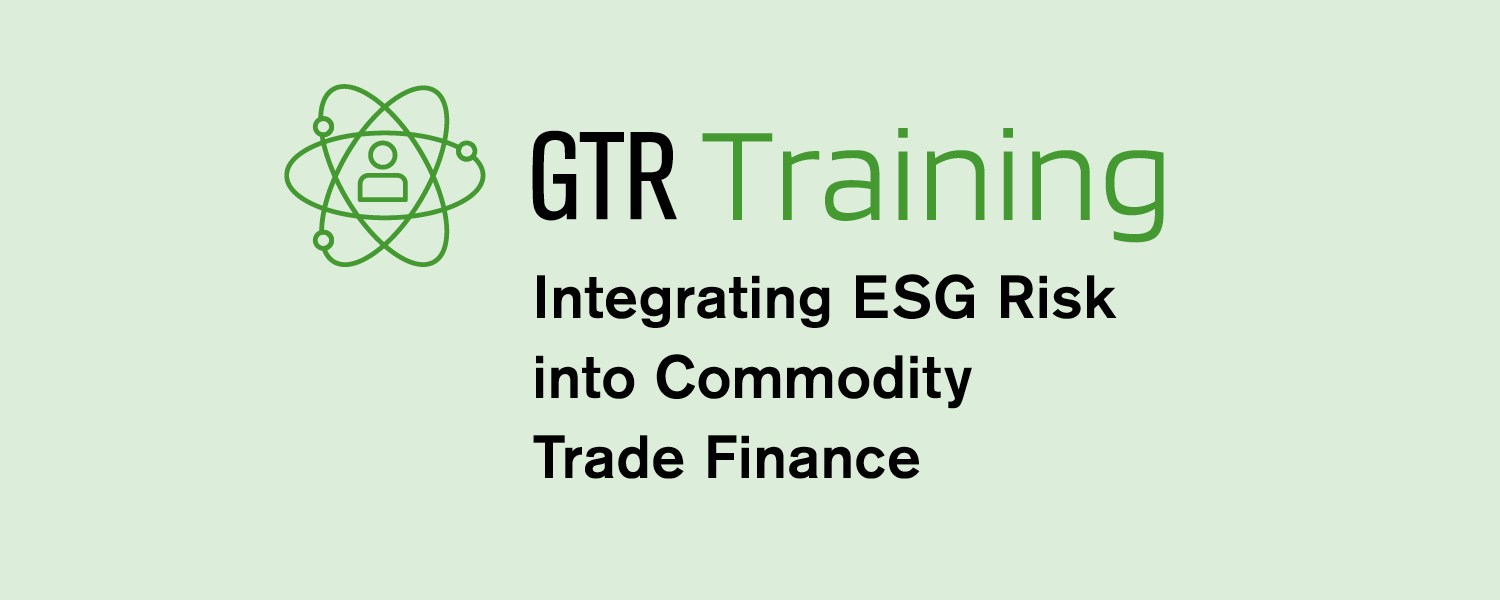ESG and sustainability have become dominating issues in the world economy. But over the past year there has been a backlash against sustainability (notably in the USA), as well as uncertain progress with new ESG regulations such as EUDR and the ICC’s Principles for Sustainable Trade. Uncertainty over the trajectory of ESG regulation presents a huge challenge for banks and underwriters, which are struggling to integrate ESG into their risk management framework and are unclear where they should focus their efforts. This challenge is especially acute for commodity trade finance, which is exposed to multiple ESG risks along the supply chain that are poorly understood.
This course has been designed to directly address these challenges, providing bank professionals with the information and context they need to stay one step ahead of the crowd. The course focuses on how ESG issues impact commodity trade finance and how to mitigate these impacts, while exploring the huge opportunities in sustainable trade finance, especially in emerging markets.
Course highlights
- Comprehensive overview of ESG and sustainability factors and impacts
- Detailed exploration of how ESG factors impact commodity trade finance, illustrated by case studies from affected sectors
- Discussion of the different approaches and frameworks that are being developed to identify and manage ESG risk in the commodity supply chain
- A range of guiding documents, frameworks and tools that can be used to successfully integrate ESG into the risk management of commodity trade finance
Key discussion points
- How the world is responding to the backlash against ESG and sustainability, notably in the EU, and how businesses should balance the changing and uncertain regulatory requirements of the markets they operate in.
- The latest developments in new ESG regulation, including the European Union Deforestation Regulation (EUDR), the Carbon Border Adjustment Mechanism (C-BAM) and the Task Force for Nature-Related Financial Disclosures (TNFD)
- The latest developments with the ICC’s Principles for Sustainable Trade (Wave 3), which were recently endorsed by four of the world’s largest banks, as well as the industry’s response to them, including the ITFA white paper co-authored by our host, Dr Tedd George, which argues that Western-designed standards will not work in African markets and could end up making the trade finance gap worse, especially for SMEs. Read the white paper.
» Gain 7 CPD points
This event content is accredited by The London Institute of Banking & Finance as meeting the standard for ongoing CPD towards recertification of International Trade Finance Qualifications
Agenda
The training will include a number of polls (using Mentimeter) to gauge student knowledge and expertise, and the discussions will be highly interactive, with plenty of opportunities for students to discuss the topics covered in the course and relate them directly to their own work and experience in commodity trade finance.
Day 1
09.00 BST
Opening words from trainer, Dr Tedd George, housekeeping, course outline and objectives of Day 1, opening polls
09.10-10.10 BST
Background to sustainability, ESG and commodity trade finance
- What are ESG and sustainable finance, and what is driving their growth?
- Key global ESG and sustainability frameworks
- How exposed are commodity supply chains to: Environmental factors, Social factors, Governance factors
- Key commodity sectors affected by ESG risk
- After the backlash, where does ESG go from here?
10.10-10.20 BST
Break
10.20-11.30 BST
Assessing ESG impacts in commodity trade finance
- Group Exercise: How exposed is your business/client to ESG risks?
- How to measure ESG impacts in the commodity & trade value chain
- Key sources of ESG data and ratings
- ESG assessment tools & approaches for trade finance
- Group Exercise: Using BII’s E&S Toolkit for assessing ESG risk exposure
11.30-11.40 BST
Break
11.40-12.20 BST
Group discussion on how ESG risks impact businesses, clients and services in the commodity trade finance space
This moderated group discussion will explore how ESG factors impact your business. How do these risks manifest, where do they have the strongest impacts (e.g. profitability, cost of risk, reputational damage?), and which sectors are most exposed? Does your business have a sustainability strategy and transition plan, and what tools are at your disposal to address ESG risks and impacts?
12.20 BST
Wrap up & final questions
12.30 BST
End of Day 1
Day 2
09.00-09.10 BST
Opening words, housekeeping, Quizfire Quiz on Day 1’s material
09.10-10.10 BST
Physical and transition risk for commodity trade finance
- What are physical and transition risks, and how do they impact differently?
- Transition risks affecting the commodity trade supply chain
- Physical risks affecting the commodity trade supply chain
- Implications for banks, traders & producers of commodities
- Group exercise: Consider the physical & transition risks facing your client
10.10-10.20 BST
Break
10.20-11.30 BST
The evolving ESG regulatory landscape for commodity trade
- Regulating the ‘transition’, including the SDGs & Paris Accords
- Barriers to making commodity trade sustainable
- The mismatch between trade finance and ESG regulation
- Key initiatives to integrate ESG into commodity trade finance, including: TCFD / TNFD, ESRS / CSRD, C-BAM, EUDR, ICC Principles for Sustainable Trade Finance
- Key tools for managing ESG regulatory requirements and risks
11.30-11.40 BST
Break
11.40-12.20 BST
Group Exercise
Review of case study on a Dubai-based company seeking finance for exports of LNG from the UAE to Germany. Students will be put into breakout groups (4-5 people in each) to review the case study. The exercise will include a comprehensive review the ESG risks and assessment of the impacts, after which students will jointly develop measures to avoid or mitigate these impacts. There will be a focus on looking for opportunities to convert risks into financing and business, as well as on identifying areas where trade finance has unique requirements to integrate ESG factors. Each breakout group will share its findings as part of a broad group discussion, tying together the learnings of the training.
12.20-12.30 BST
Wrap up & key takeaways
12.30 BST
End of Day 2
Discounts and promotions
» 10% Early booking discount – Available until September 19
Early booking discount available for new registrations only and not in conjunction with additional discounts. 10% is automatically processed during online checkout or with a GTR team member.
Booking your place at GTR Training 2025
To reserve your place, please email registrations@gtreview.com.
Payment options — including invoice and card payment links — will be provided via email following your booking request.
Booking Categories
Two-day course – £795*
Additional Information
-
All rates are subject to +20% VAT for locals and non-residents.
-
Early booking discount: A 10% reduction is automatically applied to bookings made by 19 September 2025.
-
Multi-booking discount: A 15% discount is automatically applied to the second booking and any thereafter.
-
Invoice payment to be made ahead of the course, starting on 21 October 2025.
- By booking, you agree to GTR’s Terms & Conditions, including the Payment and Cancellation Policy.




